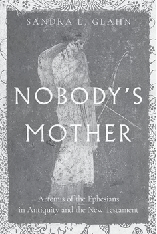Review Of "Nobody’s Mother" -- By: Denny R. Burk
Journal: Eikon
Volume: EIKON 06:1 (Spring 2024)
Article: Review Of "Nobody’s Mother"
Author: Denny R. Burk
Eikon 6.1 (Spring 2024) p. 116
Review Of Nobody’s Mother
Denny R. Burk is President of The Council on Biblical Manhood and Womanhood and Editor-in-Chief of Eikon.

Sandra L. Glahn. Nobody’s Mother: Artemis of the Ephesians in Antiquity and the New Testament. Lisle, Illinois: IVP Academic, 2023.
Paul’s words in 1 Timothy 2:8–15 have long been a watershed in the debate between complementarians and egalitarians. In these verses, Paul addresses both men and women as they come together for public worship as well as the particular danger women face in childbearing. Complementarians have generally understood Paul’s prohibition in verse 12 to restrict women from certain governing and teaching roles within the church and have understood “saved through childbearing” in verse 15 to relate in some way to the special calling of motherhood. Egalitarians have construed these texts to have no restrictions on women in teaching or leadership, even as they acknowledge the dangers associated with childbearing. Over the last several decades, barrels of ink have been spilled trying to sort out the issues with both sides trying to win the battle of persuasion. The controversy shows no signs of abating anytime soon.
Enter Sandra Glahn, professor of media arts and worship at Dallas Theological Seminary. She advances a provocative and somewhat novel thesis in her new book Nobody’s Mother: Artemis of the Ephesians in Antiquity and the New Testament. The book is one-part personal narrative and another part study of New Testament backgrounds. She focuses on how the worship of the goddess Artemis in first-century Ephesus should inform our interpretation of the Pastoral Epistles. In particular, she is concerned with how false teaching emanating from the local Artemis cult shapes our understanding of Paul’s contention that women will be “saved through childbearing” (1 Tim. 2:15). Along the way, Glahn also offers a fresh interpretation of the entire paragraph (1 Tim. 2:9–15), including comments on the much-disputed prohibition in verse 12, “I do not allow a woman to teach or exercise authority over a man, but to remain quiet.”
Eikon 6.1 (Spring 2024) p. 117
Her conclusions fall in line with the egalitarian stream of interpretation of this watershed text.
An Overview Of The Project
Glahn says the impetus for her project is...
Click here to subscribe
